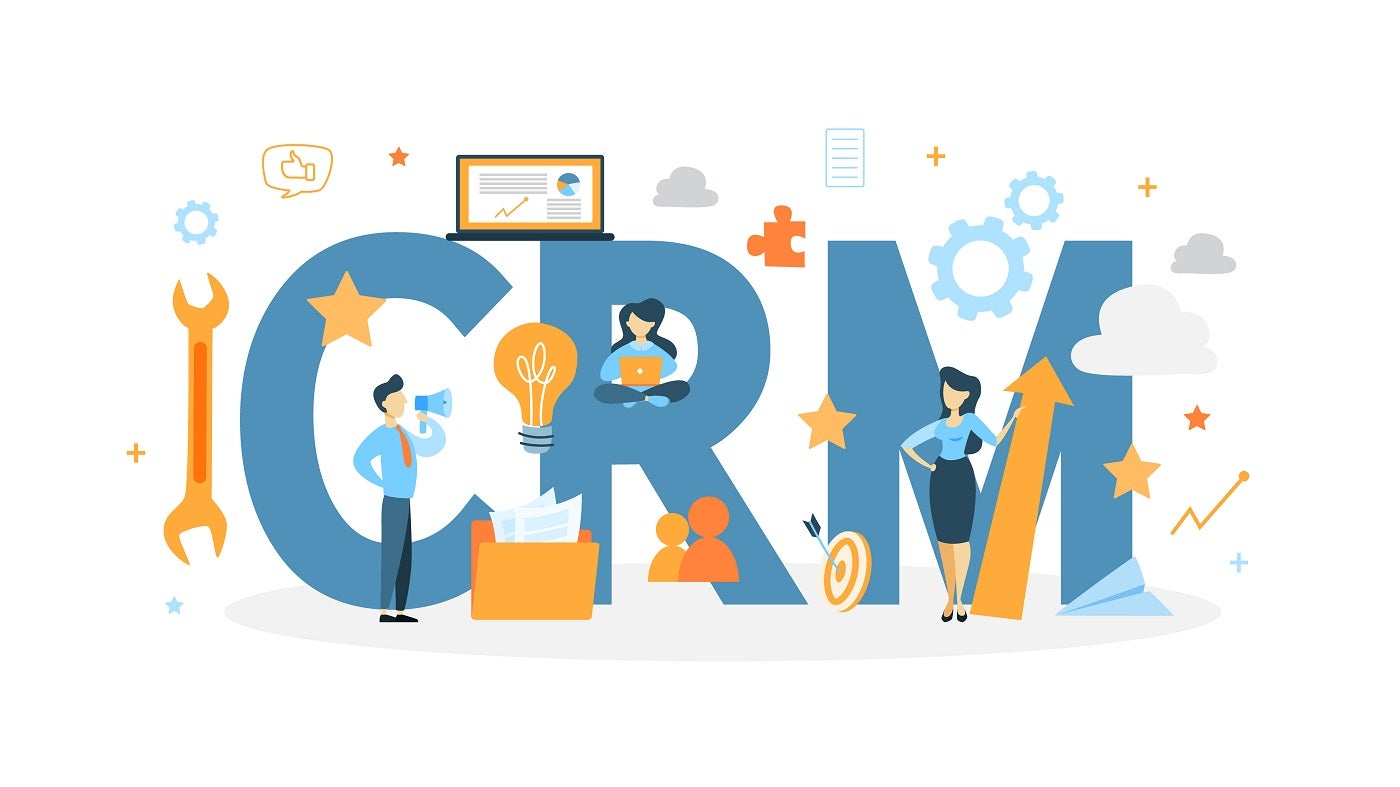- Best overall free CRM: HubSpot CRM
- Best for secure contact management: Zoho CRM
- Best free CRM offering sales and marketing tools: EngageBay
- Best free CRM with lead engagement tools: Freshsales
- Best free CRM for project management: Insightly
- Best for project management: Capsule
- Best free CRM for students or nonprofits: monday sales CRM
Several customer relationship management providers offer free versions of their software that come with limited access to their features while still providing the value of a paid tier and managing customer relations. Typically, free CRM software is capped at a certain number of users, making it most ideal for small businesses or even freelancers.
Some of the most popular providers that offer a free tier of their CRM tool include HubSpot, Zoho CRM, EngageBay, Freshsales and more. These free versions can be sufficient for organizations since they can still provide the core CRM features users need to organize and track client engagements. In addition to those core features, each provider has unique capabilities, such as advanced marketing tools or niche industry specializations.
Top free CRM software comparison
The top free CRM software offers access to pipeline and document management, a mobile app or offline access, and native or third-party integrations. This way, businesses can sync their free CRM tool to their existing tech stack and integrate it with their sales process.
Beyond these features, some additional functions can be included or added for small monthly fees.
| Software | Pipeline management | Documentation tracking | Mobile app | Integrations | Starting paid price* |
|---|---|---|---|---|---|
| HubSpot CRM | Yes | Yes | Yes | Yes | $15 per seat per month |
| Zoho CRM | Limited | Yes | Yes | Yes | $14 per seat per month |
| EngageBay | Yes | Yes | No | Yes | $11.95 per seat per month |
| Freshsales | Yes | Limited | Yes | Yes | $9 per seat per month |
| Insightly | Yes | Limited | No | Yes | $29 per seat per month |
| Capsule | Limited | Yes | Yes | Yes | $18 per seat per month |
| monday sales CRM | Yes | Limited | Yes | Yes | $12 per seat per month |
| *Price when billed annually. | |||||
HubSpot CRM: Best overall free CRM

HubSpot’s free CRM comes with access to a range of both marketing and sales tools. Users can complete sales tasks directly within a customer’s profile and monitor incoming deals in the free pipeline feature. Allowing up to 5 users grants unbeatable access to HubSpot’s native and third-party integrations. HubSpot’s paid tiers offer more commerce features for quotes, invoices and payment links.
Pricing for paid tiers
- Sales Hub Starter: $15 per seat per month, billed annually, or $20 when billed monthly. The Starter plan includes all free tools plus simple automation, e-signature, conversation routing and more.
- Sales Hub Professional: $90 per seat per month, billed annually, or $100 when billed monthly, plus a one-time $1,500 onboarding fee. This plan includes all Starter features and prospecting workspace, platbooks, forecasting and more.
- Sales Hub Enterprise: $150 per seat per month, with an annual commitment and one-time $3,500 onboarding fee. Users of this plan receive all Professional tools plus advanced permissions, predictive lead scoring, conversation intelligence and lead form routing.
Features
- AI email writer: Use AI to generate sales outreach emails to help drive email marketing.
- Meeting scheduler: Schedule client meetings fast with little hassle with syncs to Google Calendar and Office 365 Calendar.
- Live chat software: Connect website visitors to sales reps in real time to convert new prospects, improve customer relations and close more deals (Figure A).
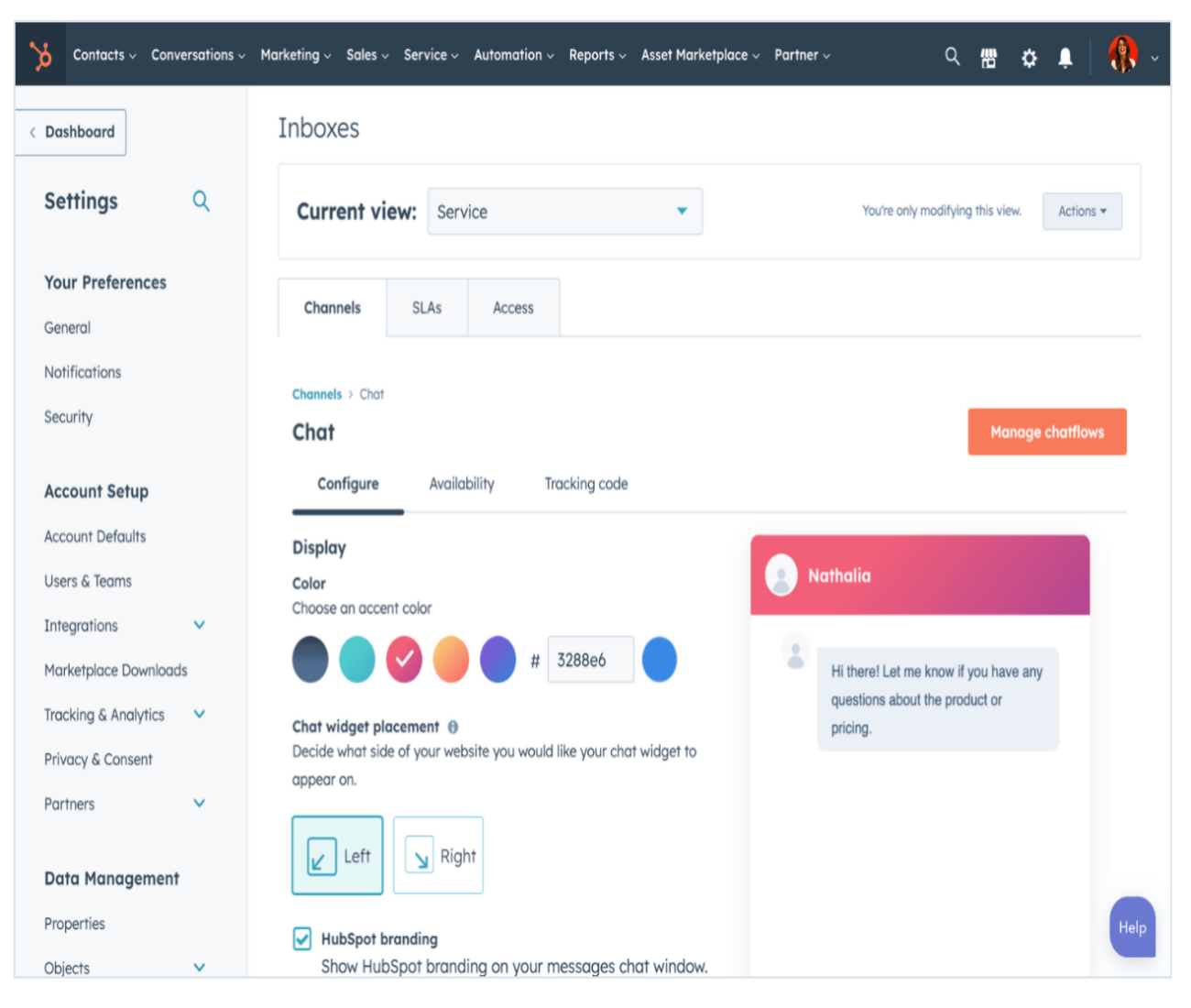
HubSpot CRM pros and cons
| Pros | Cons |
|---|---|
| Intuitive user interface. | Paid plans and add-ons can be pricey. |
| Robust sales and marketing tools. | Lack of reporting tools. |
| Relatively easy onboarding and CRM implementation. | No live support for free users. |
Why we chose HubSpot
HubSpot is a high-scoring customer platform with a number of solutions for marketing, sales, service, content, operations and commerce. Each product offered by HubSpot is connected to the same underlying CRM database, giving businesses insight into every contact at each stage in the customer journey. The sales software is powerful and intuitive and can support growing sales organizations. This makes HubSpot an extremely scalable platform for businesses of all sizes.
While HubSpot’s free CRM is the most robust of those listed here, your business might eventually need to scale up to a premium plan. If that’s the case, HubSpot’s paid tiers can be pretty costly compared to others. If you’re interested in a tool with more affordable premium plans, check out Freshsales.
Zoho CRM: Best for secure contact management
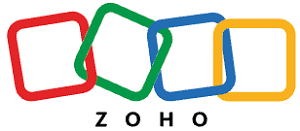
Zoho CRM’s free-for-life tier offers solid core features for up to three users. With it, users can create basic sales modules for automations and task management and access the CRM through the mobile app. With security features that protect client profiles, enforce a role-based hierarchy and produce CRM audit logs, Zoho CRM ensures all contact information is GDPR-compliant. Users must upgrade to a paid tier to access Zoho CRM’s advanced marketing tools.
Pricing for paid tiers
- Standard: $14 per user per month, billed annually, or $20 per user when billed monthly.Users receive basic modules, multiple pipelines, homepage customization, predefined reports and more.
- Professional: $23 per user per month, billed annually, or $35 per user when billed monthly. This tier supports all Standard features plus custom reports and dashboards, email relay, field-level security and more.
- Enterprise: $40 per user per month, billed annually, or $50 per user when billed monthly. The Enterprise plan comes with all Professional features and reporting hierarchy, custom modules and buttons, and all AI tools.
- Ultimate: $52 per user per month, billed annually, or $65 per user when billed monthly. This tier includes all Enterprise offerings plus Zoho Analytics.
Features
- Lead tracking: View lead profiles and activity history from one dashboard to know where they are in the buying process and when the best time is to start engaging more.
- Document management: Organize and control all shared documents between sales reps and even content shared outside the business with clients.
- Zia AI tool: Monitor lead activity or even access forecasting insights by just asking Zoho’s AI assistant directly (Figure B).
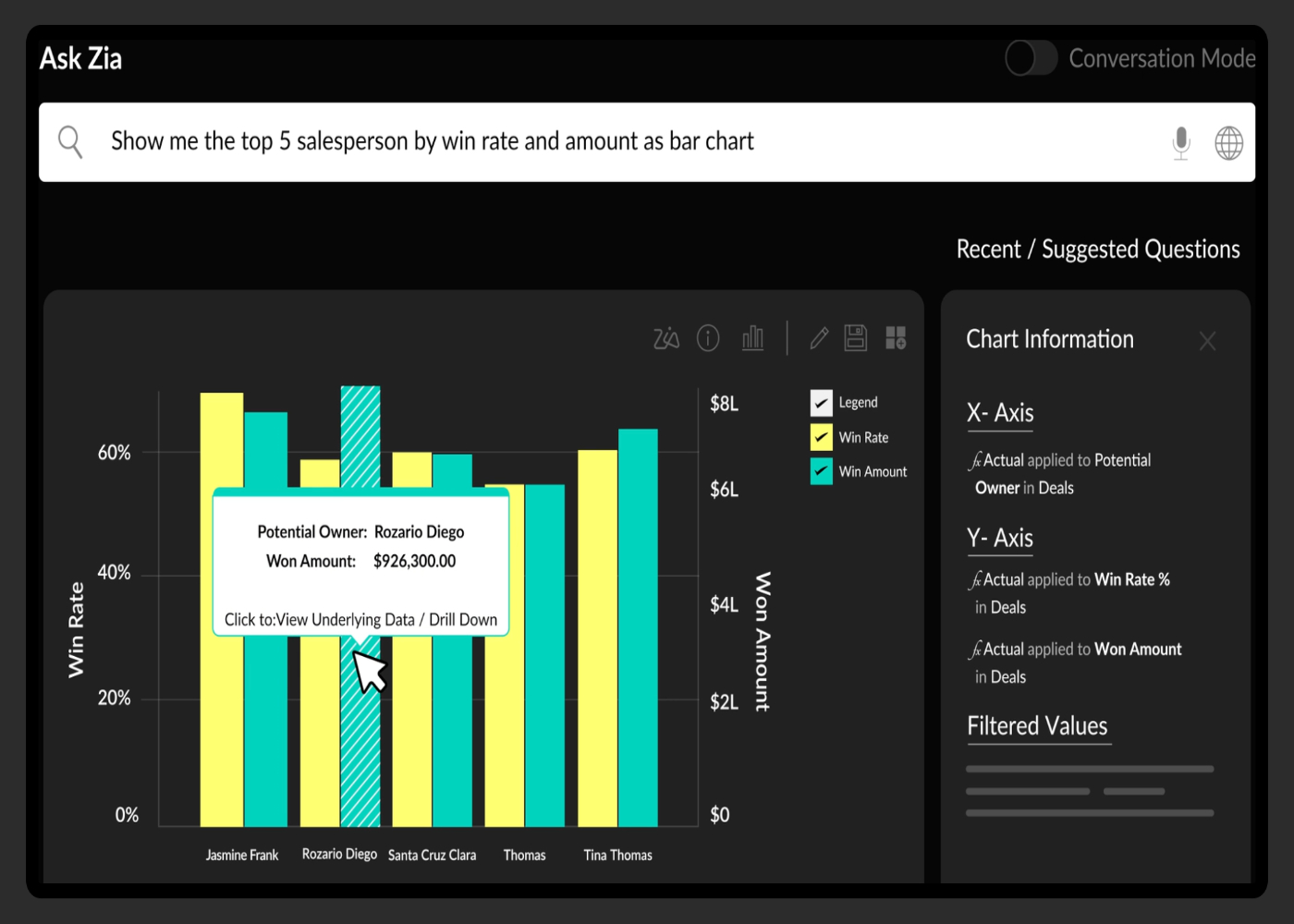
Zoho CRM pros and cons
| Pros | Cons |
|---|---|
| 15-day free trial. | Free plan has no social integration. |
| Robust sales forecasting. | Some users report poor UI and UX. |
| 24/7/365 data security. | User reports of platform learning curve. |
Why we chose Zoho CRM
Zoho CRM is a popular CRM platform that’s used by businesses across the world. With sales, marketing and service applications, Zoho CRM bundle plans offer organizations an integrated experience of Zoho’s solutions. The marketing automation on the CRM platform includes advanced email management, lead attribution and segmentation. Zoho also prioritizes customer privacy with no adjunct surveillance and zero ad-providers on its network.
Zoho CRM’s free tier can be considered limited, with no social integration or analytics. If you’re wanting a similar tool with marketing automations and sales tools for free, and with the bandwidth for more users, consider looking into HubSpot.
For more information, read the full Zoho CRM review.
EngageBay: Best free CRM offering sales and marketing tools

EngageBay’s free CRM system provides core and advanced features for both sales and marketing teams for up to 15 users and 250 contacts. Departments can work as a single team through EngageBay’s free Small Business CRM. The free tier offers marketing automation, deal management and landing page builders. All of which facilitates better alignment between marketing and sales teams and enhances overall revenue growth. Accessing custom domains and A/B testing does require a paid subscription.
Pricing for paid tiers
- Basic: $11.04 per user per month when billed biennially, $11.95 when billed yearly and $12.99 when billed monthly. This plan comes with 500 contacts and companies, multiple del tracks, calling tools, predictive lead scoring and more.
- Growth: $42.49 per user per month when billed biennially, $45.99 when billed yearly and $49.99 when billed monthly. The Growth tier supports all Basic features plus 20,000 contacts and companies, email scheduler, leaderboard, sales automation and more.
- Pro: $67.99 per user per month when billed biennially, $73.59 when billed yearly and $79.99 when billed monthly. This tier includes all mentioned features, in addition to auto dialer, proposal analytics, role management, call records and scripts, custom reporting and more.
Features
- Multi-channel campaigns: Create branded marketing campaigns that can be deployed across multiple channels, such as email, website and social media.
- Lead scoring: Segment and prioritize incoming leads based on preset criteria from an organization’s ideal customer profile.
- Website lead capture: Collect and store website visitor information with pop ups and landing pages (Figure C).
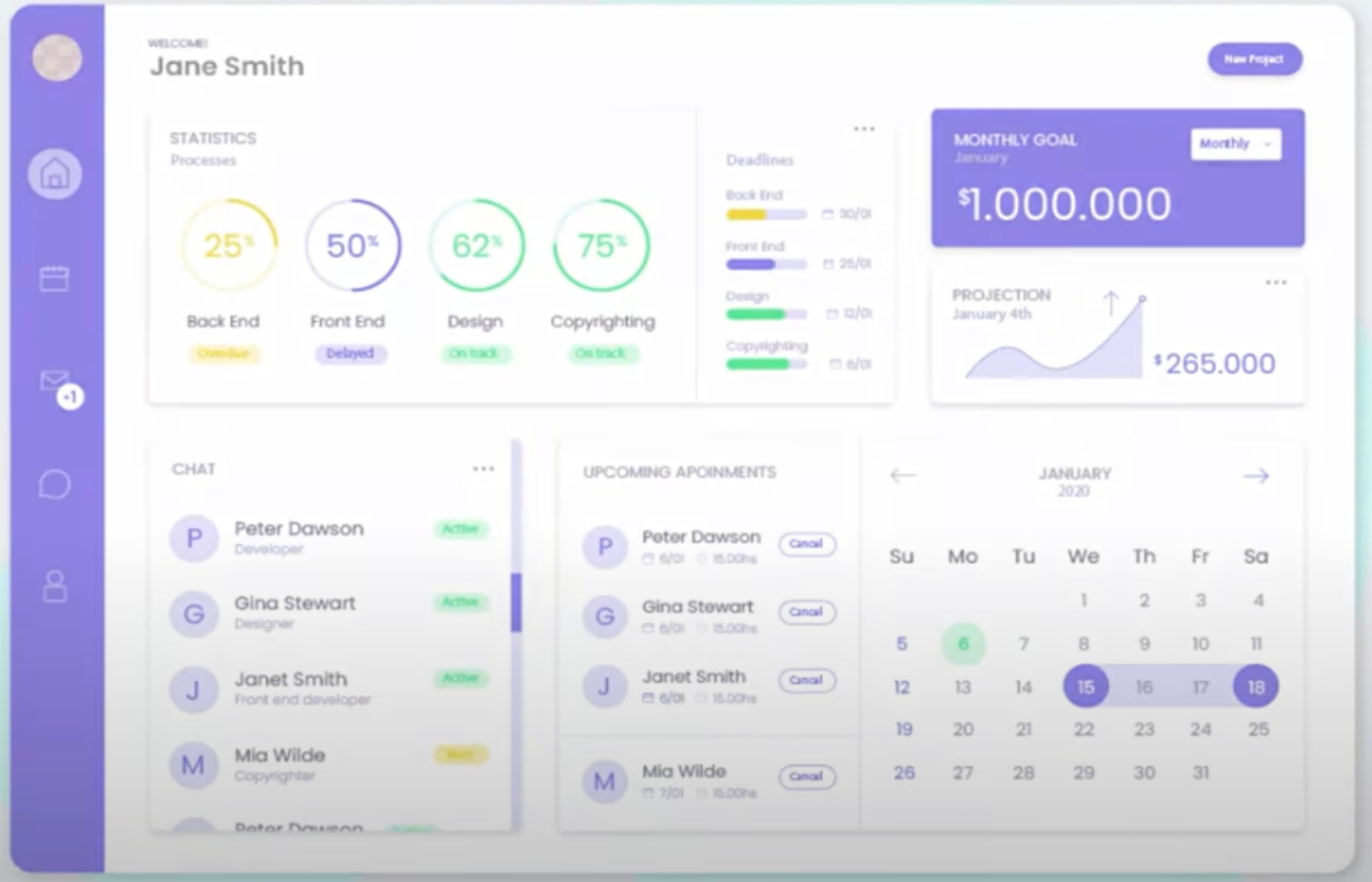
EngageBay pros and cons
| Pros | Cons |
|---|---|
| Multiple billing options. | Paid tiers might require long commitments. |
| 360-customer views. | Third-party integrations are limited. |
| Predictive lead scoring. | Email scheduling is limited to Growth and Pro tiers. |
Why we chose EngageBay
EngageBay is another affordable CRM with sales, marketing and service solutions. Support teams can implement their helpdesk or live chat software to resolve queries quickly and deliver strong support to clients. EngageBay has a unique pricing and billing structure, offering discounts on its premium tiers if businesses choose to commit to a biennially contract.
Compared to most providers on this list, EnagageBay’s free tier supports more than the average number of users. But their list of possible integrations is lacking in comparison to providers like HubSpot, Freshsales or Zoho CRM.
To learn more about this provider, head over to our in-depth EngageBay review.
Freshsales: Best free CRM with lead engagement tools

Freshsales is a robust sales CRM offering advanced sales tools for sales teams to engage with leads quickly. The free tier allows up to three users and offers email templates and a sales dashboard. With built-in chat, email and phone tools, reps are able to begin nurturing leads in real time. For more access to Freshsales AI tools and lead scoring, users have to purchase a paid tier.
Pricing for paid tiers
- Growth: $9 per user per month, billed annually, or $11 per user when billed monthly. This plan includes contact management, activity timeline, task management, data import/export and more.
- Pro: $39 per user per month, billed annually, or $47 per user when billed monthly. The Pro tier supports all Growth features plus 2 GB of file storage per user, sales sequences, power dialer, conference calling and more.
- Enterprise: $59 per user per month, billed annually, or $71 per user when billed monthly. This tier includes all Freshsales CRM features like holiday routing, forecasting insights, audit logs, record types and more.
Features
- Contact lifecycle stages: Capture the sales lifecycle each individual lead is in with customizable stages.
- Freddy AI copilot: Activate Freshsales AI assistant, Freddy, to parse emails and analyze historical lead data.
- Email templates: Create preset templates to engage with new leads quickly (Figure D).
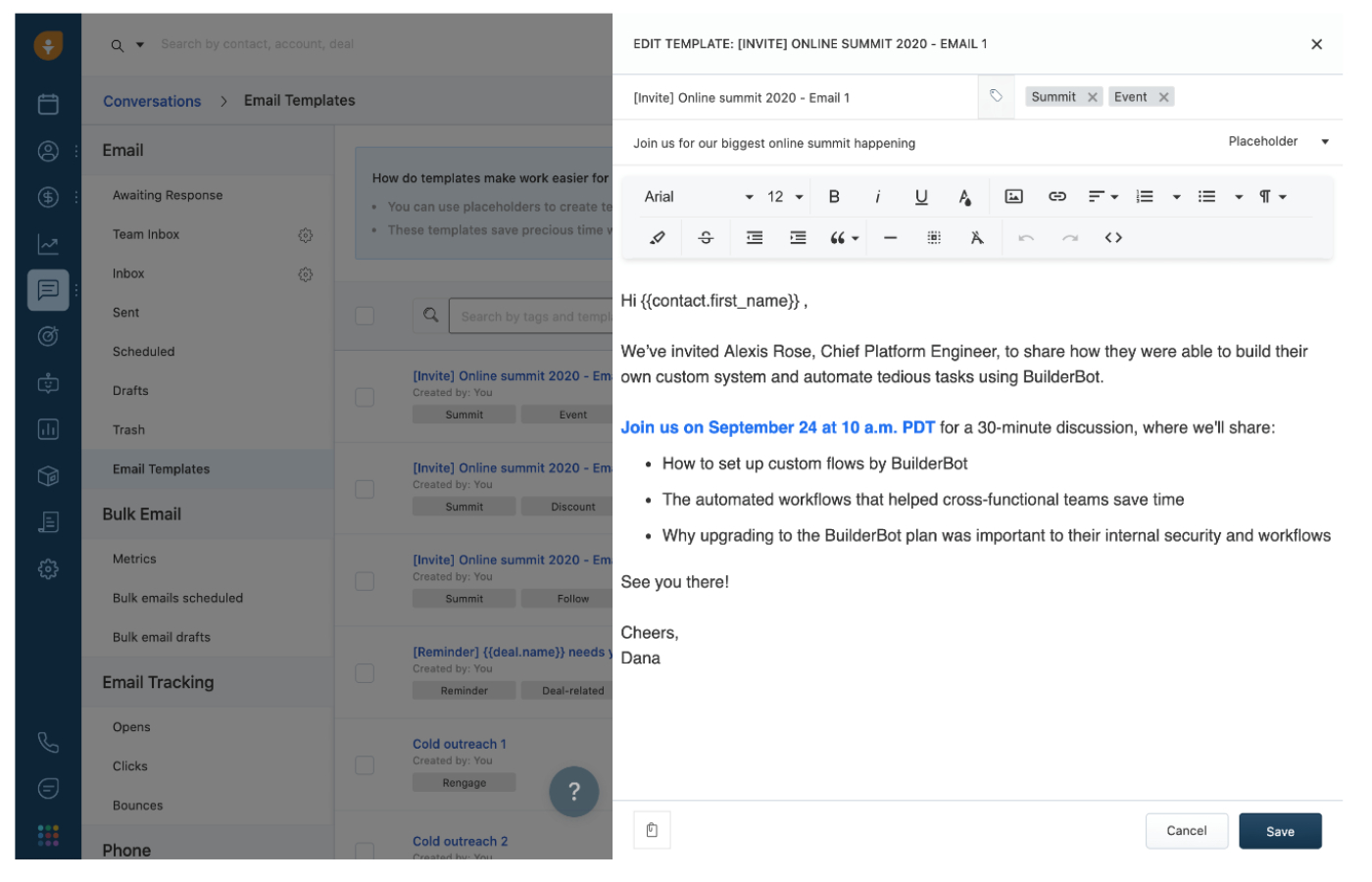
Freshsales pros and cons
| Pros | Cons |
|---|---|
| 21-day free trial. | No workflows offered in the free tier. |
| 24/5 customer support via phone, email and chat. | Marketing features are limited. |
| Kanban dashboard views. | Some core features aren’t offered in the free tier. |
Why we chose Freshsales
Freshsales is powerful customer service, IT and CRM software. Freshsales’ AI assistant, Freddy AI, provides advanced self service, copilot and insight solutions. Users can deploy intelligent chatbots to resolve issues, have an AI coach and collaborator to improve selling performance, and get AI-driven insights to help businesses anticipate issues and spot opportunities.
Freshsales’s premium plans are a great mix of core and advanced CRM features for the price. But if you’re wanting a strictly free tool to help with a startup or home business that includes some marketing features and a mobile app, look into Zoho CRM.
For more information, read the full Freshsales review.
Insightly: Best free CRM for project management
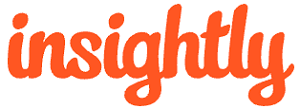
Insightly’s free CRM includes access for two users and up to 2,500 records, five email templates, 10 emails per day and more. This allows for basic contact and pipeline management, as well as an additional pipeline for project management. Within the software, users can create highly visual workflows through colorful kanban boards. If you want lead scoring and routing functions, users need to upgrade to the Professional or Enterprise tiers.
Pricing for paid tiers
- Plus: $29 per user per month, billed annually. The Plus plan includes lead management, automated emails and templates, task management, configurable reports and more.
- Professional: $49 per user per month, billed annually. The Professional plan offers all Plus features as well as 100 real-time insight cards, unlimited role-based permissions, custom page layouts and more
- Enterprise: $99 per user per month, billed annually. This plan includes all mentioned features, in addition to 200 custom fields, custom apps, calculated fields, pricebooks, quotes and more.
Features
- Native integrations: Access integrations to apps like QuickBooks Online, PandaDoc and Xero.
- Email management: Allow complete visibility across teams on every customer email interaction.
- Sales pipelines: Capture relevant details about each incoming lead and track where they are in your sales process (Figure E).
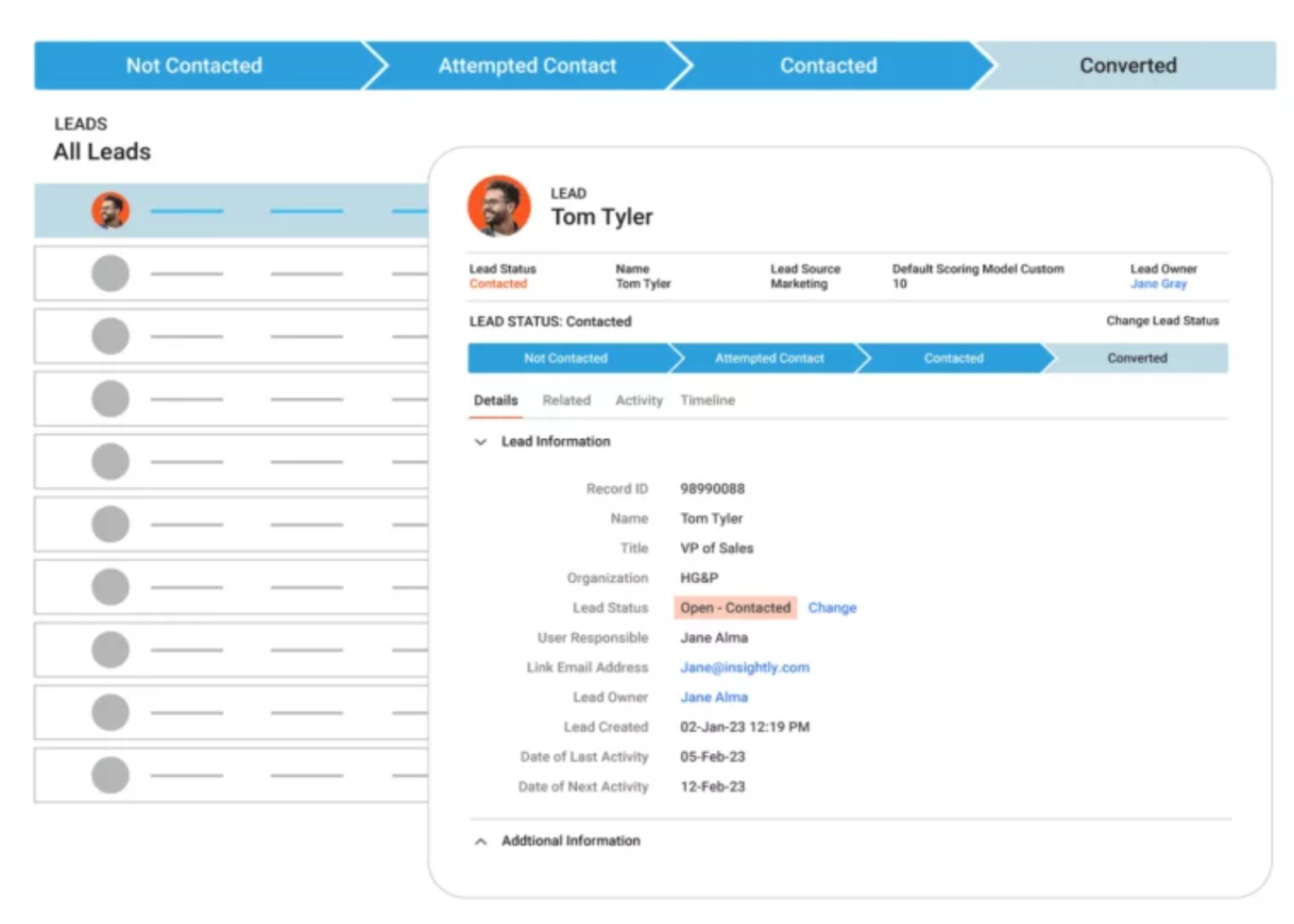
Insightly pros and cons
| Pros | Cons |
|---|---|
| 14-day free trial. | User support costs extra. |
| 1,000+ third party and native app integrations. | Free version only supports two custom fields. |
| 5 free email templates. | Only access community forums with premium plans. |
Why we chose Insightly
Insightly is a full-featured CRM tool that offers three main solutions for sales, marketing and customer support. The CRM software helps streamline sales processes and drive revenue by importing and routing leads and empowering remote teams with a mobile app. The marketing automation uses A/B testing to attract visitors to websites and convert them into prospects. And the customer service solution elevates a business’s client experience through a convenient support portal with ticket management and insights.
Insightly’s modern platform can offer small to midsize businesses a range of functionality. But if you’re an enterprise looking for a free tool, consider looking into HubSpot for their 2,300 user cap on their free tier.
Read our independent Insight review for more feature callouts, use cases and more.
Capsule: Best for project management

Capsule is a simple online CRM with powerful sales and relationship management tools. Capsule’s free version allows up to two users, 250 contacts and 50 MB of storage space. Users can manage sales opportunities with project management tools to plan events or track customer activities, such as support queries or onboarding. Every tier, including the free version, allows for daily task reminders and AI content assistance. Upgrade to a paid subscription for better user permissions and advanced reporting.
Pricing for paid tiers
- Starter: $18 per user per month when billed annually, or $21 when billed monthly. This plan offers 30,000 contacts, 1 sales pipeline and project boards, 50 custom fields, 5 email templates and more.
- Growth: $36 per user per month when billed annually, or $38 when billed monthly. The Growth plan includes everything in Starter, plus 60,000 contacts, 3 shared mailboxes, 1,000 AI content assists and workflow automation.
- Advanced: $54 per user per month when billed annually, or $60 when billed monthly. This tier offers all mentioned features, in addition to 300 custom fields, 500 email templates, 50 project boards and more.
- Ultimate: $72 per user per month when billed annually, or $75 when billed monthly. The Ultimate plan includes 240,000 contacts, 100 sales pipelines, unlimited custom fields, 10 shared mailboxes and more.
Features
- Opportunity highlights: Notify reps when leads are consistently inactive or opportunities are considered stale.
- Two-factor authentication: Confirm user security when anyone tries to access your CRM through the mobile app.
- Workflow automation: Automate sales workflows to make sales tasks quicker and more consistent (Figure F).
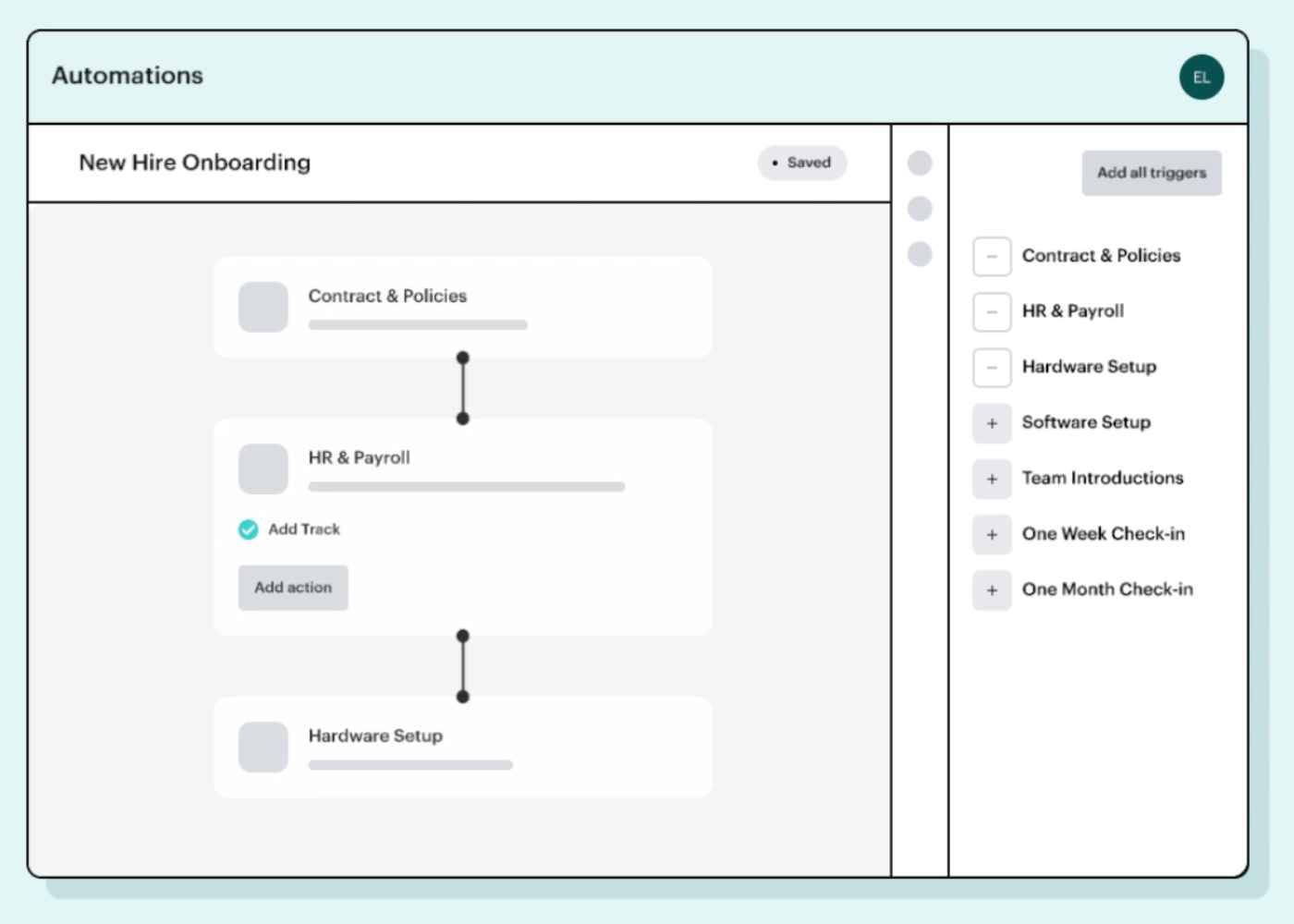
Capsule pros and cons
| Pros | Cons |
|---|---|
| 14-day free trial. | No custom automations available in the free tier. |
| 1,000+ available integrations. | No assigned sales teams or support. |
| Exporting for data security. | Users report weak contact sorting. |
Why we chose Capsule
Capsule is a simple CRM platform that grants users access to sales pipeline dashboards, calendar and task management tools, Outlook and Gmail integrations and two-factor authentication. The premium tiers offer a range of features for growing businesses, including high-level sales reporting, access permissions and customizations. All of this makes Capsule an intuitive tool for any expertise level to implement into their business.
Capsule’s integrations with third-party tools and APIs for developers make it an extremely customizable platform. If you’re wanting a similar tool with even more integration functionality in the free tier, check out HubSpot.
Read our detailedCapsule reviewfor more details.
monday sales CRM: Best free CRM for students or nonprofits

monday sales CRM offers a range of essential features as well as tools for improving productivity and customer relationships. It is important to note only students or nonprofits can access monday.com for free or at a highly discounted price after filling out relevant forms. monday.com’s customizable dashboard and pipelines do make it great for task management. But if your organization doesn’t fall within the industry categories for the discount, monday.com’s basic CRM tier is relatively still affordable. Upgrade to the Pro CRM tier for better access to sales analytics.
Pricing for paid tiers
- Basic CRM: $12 per user per month when billed annually, or $15 when billed monthly. Users gain access to unlimited customizable pipelines and contacts, templates for lead and deal management, the mobile app and unlimited free viewers.
- Standard CRM: $17 per user per month when billed annually, or $20 when billed monthly. This plan includes all features in the Basic CRM tier plus email integrations, activity management, AI email generation, quotes and invoices and more.
- Pro CRM: $28 per user per month when billed annually, or $33 when billed monthly. The Pro CRM tier includes sales forecasting, email templates, email tracking, mass emails, Google Calendar sync and more.
- Enterprise CRM:Contact monday.com directly for a custom quote. This plan supports lead scoring, team goals, advanced analytics, account management and more.
Features
- Customizable pipeline: Create pipelines that directly reflect your sales process and can be adjusted as your process changes.
- Activity management: Log all client activities in one hub, such as emails, meetings and more.
- Content generation and summarizing: Create polished and branded content or summarize notes from a call transcript or meetings (Figure G).
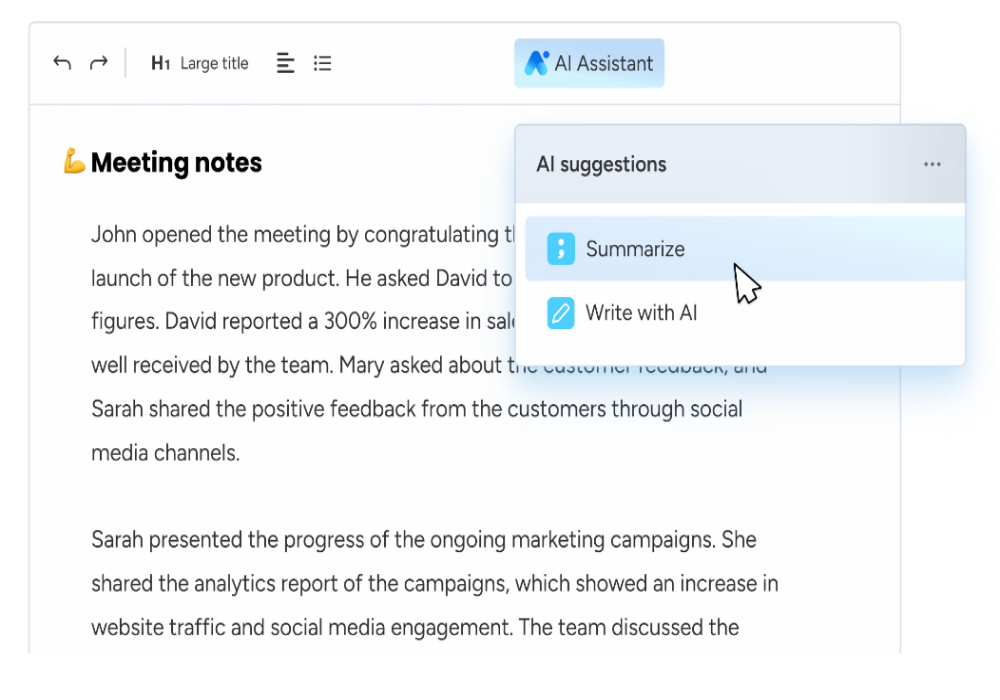
monday sales CRM pros and cons
| Pros | Cons |
|---|---|
| 14-day free trial. | Free tier only applies to students and nonprofits. |
| Custom templates for contact and deal management. | Insight and forecasting tools are only available through the Pro and Enterprise tiers. |
| iOS and Android mobile app. | Post-sale tools are only available through the Enterprise tier. |
Why we chose monday sales CRM
monday sales CRM is a no-code CRM tool with a wide range of industry specializations. This includes software and IT services, manufacturing, financial services, consumer goods and more. The platform itself is intuitive, with visually appealing dashboards. Users can completely customize the tool for any customer-facing need as well as implement automations that reduce general human error and increase productivity.
Since monday sales CRM only offers a free version for unique scenarios, your business might not meet those guidelines. If that’s the case, consider looking into HubSpot for their robust free offerings.
Want to know more? Check out our independentmonday sales CRM review.
How do I choose the best free CRM software for my business?
Now that we’ve given you a list of the top CRM providers with robust free versions, you need to narrow them down to find the software that best fits your goals. The next step would be to request demos or sign up for free trials from the providers that peak your interest. This way, you can begin communicating directly with the provider’s sales team and start onboarding the software.
Below are questions to consider asking when researching free CRM software:
- Does the free version offer the core features you need that are expected in the top general CRM?
- What is the total in-market expertise for your industry, if any?
- Is the CRM considered open-source, or is that something your business needs?
- Is the CRM scalable and detailed enough to fit your small business or enterprise?
- Does the CRM software integrate with tools you already have in your tech stack?
FORUM: Here are some factors to consider when choosing a CRM.
Review methodology
To fairly review each provider’s free CRM offerings, I used an in-house rubric with outlined criteria and subcategories of CRM industry standards. After running each provider through that rubric, an algorithm calculated an overall rating and I used that to assign each software an ideal use case.
Here’s a breakdown of the scoring criteria I followed:
- Cost: Weighted 25% of the total score.
- Core features: Weighted 25% of the total score.
- Customizations: Weighted 15% of the total score.
- Integrations: Weighted 15% of the total score.
- Ease of use: Weighted 10% of the total score.
- Customer support: Weighted 10% of the total score.
